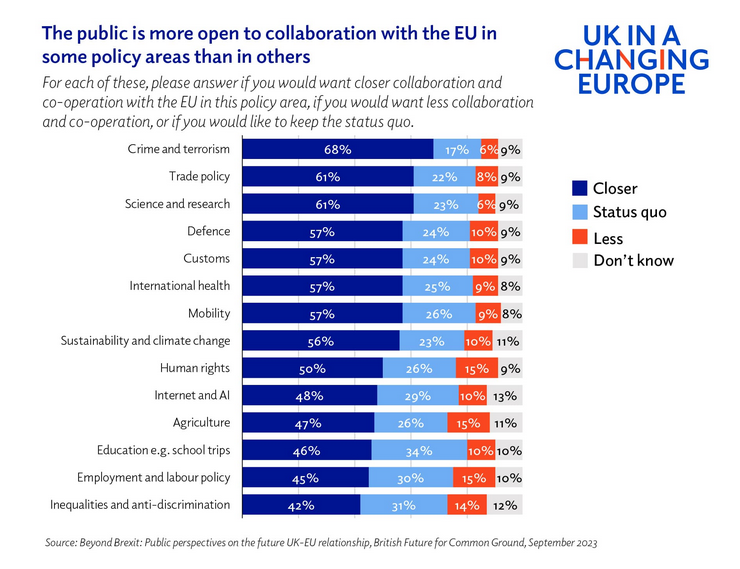Jake Puddle summarises British Future’s new report examining public attitudes towards a closer relationship with the EU, which finds that voters support a closer relationship with Europe but that there is an aversion among voters to re-opening Brexit divisions.
President of the European Commission Ursula von der Leyen raised eyebrows recently by claiming that the UK is on a ‘direction of travel’ toward re-joining the EU, though it would be up to young people to reverse Brexit. It remains to be seen whether the children of today will grow up to become Generation Rejoin. Nevertheless, new attitudes research from British Future indicates that the public have, since Brexit, begun to favour ‘a closer relationship’ with the EU.
A survey of 2,000 respondents and a series of 12 focus groups for our new report, ‘Beyond Brexit: Public perspectives on the future UK-EU relationship,’ finds that 52% of the public would like the UK to have a closer relationship with the EU. Just 12% said that they would prefer a more distant relationship, whereas 27% would keep the status quo.
In a similar vein to recent analysis by John Curtice, the research found that 68% of Labour supporters would prefer closer ties. This is potentially an important consideration for Keir Starmer, should he become the next Prime Minister. But across parties, the waters of opinion have muddied in the years since Brexit. Conservative supporters are split, with few (17%) wanting to see more divergence from the EU, and similar numbers supporting the status quo (41%) and a closer relationship (38%). Even among 2016 referendum voters, only a quarter (24%) of Leave voters would like the relationship with the EU to be more distant than it currently is, and slightly more (26%) would like the relationship to be closer.
Yet the public hold nuanced opinions about where exactly they would like to see Britain stand in closer alignment with Europe. On issues such as counter terrorism (68%), trade (61%), science/research co-operation (61%), defence (57%), customs (57%), international health (57%) and climate policy (56%), there is majority support for working with Europe, across the ‘Leave/Remain’ divide. Indeed, on the issues mentioned, more Leave voters wanted closer cooperation with the EU than preferred the status quo or further divergence.

Yet on other issues, public attitudes are more complex. More research is needed to test public preferences when presented with the trade-offs between potential benefits and conditions of closer alignment. For example, on immigration, most survey respondents (61%) supported cooperation on migration for work and study. However, it remains to be seen if this equates to support for free movement – unlikely, given previous research consistently finds that people place importance on controlling immigration over reducing numbers. The survey also found the public were more divided on working with the EU on refugee resettlement. Asylum debates featured strongly in our focus groups, with many participants conflating the EU with the ECHR. Some felt aggrieved by a perceived meddling from Europe in UK home affairs....
more at UKandEU
© UKandEU
Key

Hover over the blue highlighted
text to view the acronym meaning

Hover
over these icons for more information

Comments:
No Comments for this Article